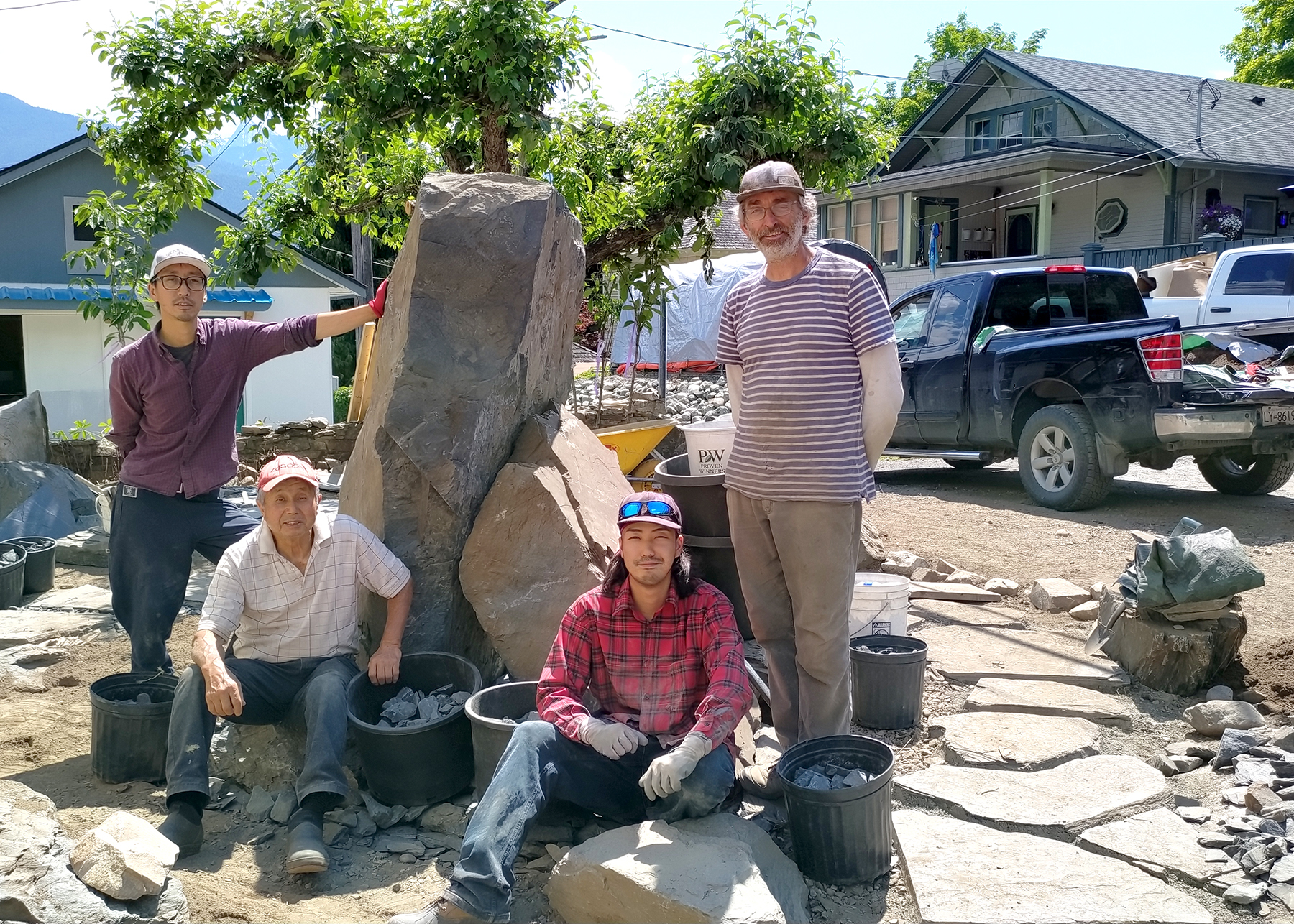The Langham is very excited to be in the final stages of completing our new Ten-Chi-Jin Japanese Garden. This garden is the product of many years of dreaming and collaboration to revitalize our exterior.
You may be interested to learn how this Garden came to be. Over the years, many local people envisioned some kind of garden in the space behind the Langham building; plans were proposed but, in the end, did not go forward; many people have stepped up to weed, trim and pick apples. Unfortunately, over the years, the space became overgrown and unsightly.
Some of those envisioning a garden thought about how appropriate it would be to have a Japanese inspired Garden to complement the Japanese Canadian Museum inside the Langham, a space to commemorate and honour the many Japanese Canadians who were interned in Kaslo during WWII when the Langham housed 80 internees. In 2021, this vision started to take shape as former Langham Executive Director, Maggie Tchir and Paul Grace-Campbell, then Executive Director, began to explore funding and local donations for a project of this scope and to work through the logistics of how it could be achieved. By 2022, these fundamental aspects were secured, a master Japanese Gardener had been contracted and a plan had been developed.
The design was developed by master Japanese Gardener, Hiro Okusa, from Vancouver. Hiro really wanted to offer visitors the opportunity to understand more deeply the internment experience of those who lost everything and were forced to come to our little town. The overall design and its various components present visitors with imagery and a sensory experience to facilitate meaningful contemplation.
In the warm months of 2022, Hiro and his team completed Phase I: the ground was cleared and prepared, the different areas of the garden were established, stone paths were built and many of the components like the upright poles and rocks were put into place. As a true artist, when a heavy linked chain was dug up unexpectedly, Hiro saw its symbolic value and gave it a place in the setting. The team continued in the spring and summer of 2023 with the planting of the ornamental cherry trees around the perimeter and the filling in of the different gardens with plants. In 2024 we completed the fence and additional plantings, bringing the garden to its current state.
Throughout this process, the Langham Board has supported and encouraged the project. We are very grateful to the funders and the community supporters, to Hiro Okusa and his team and to the Langham Executive Directors who pulled the components together to realize this vision. Having come this far, we are very pleased to anticipate having visitors and our community spend time in the Ten-Chi-Jin Garden.
A Message from Hiro Okusa
Garden ”Ten-Chi-Jin “
庭 “天–地–人”
I would like to name this garden “Ten-chi-jin” garden.
This means “Sky- Earth- Human”
For Japanese, this saying or terminology is very common and is the traditional concept that expresses the cosmos or universe.
I am trying to create the Cosmos within this small space 40×40 feet.
天“Ten “means sky, but for Japanese this has deeper meaning more than physical sky. It is like God of Christianity. I could say it is the otherness of the cosmos.
There is very common Japanese saying:
“Do not behave immoral. If you do that, people never see and know your behavior but the Ten will know, never miss it. Then the Ten will punish you.
I am expressing this concept “Ten” with these standing logs /driftwoods which are sharply pointing sky.”
地 “Chi “means the earth or, ground where we, all creatures of the earth stand and live
At this stage, Chi, the ground is not yet well expressed. But it will be when this garden is completed in phase 2 next spring.
Also you know that Chi the earth is tangible whereas Ten the sky is intangible.
人 Jin means human being, but in broader sense it includes all creatures between the sky 天and the earth 地.
In this garden, Jin is represented by rocks. Pay special attention to the two big rocks in the centre. The composition of the rocks represents humans helping and supporting one another and working together
In the Japanese sense, there is a life in everything in the cosmos and the world. And it means gods (small letter god) exists in everything in nature ,even in – 1 moku 2 Isou , which means even 1 tree and one grass , in a stone and of course even in tiny insects. Bc
So far, I explained the concept what I would like to express in this small garden.
Next…..
At the same time, I am trying to tell the story of the Japanese Canadians who were interned here during World War II.
However, it may be difficult to see this theme in this garden.
But if I can suggest a bit …
I have been thinking of the Japanese Canadians who were forcibly transplanted here, to Kaslo during the war, especially the first night they arrived here.
How they felt when you are thrown to the wildness without protection, separate from a father or a husband.
I think what they felt is nothing but despair and fear.
All you can do is look to the sky for healing and comfort.
And additionally…. I found this chain in this garden and I will leave this chain purposely here as a symbol of suffered souls the Japanese used to live here, Kaslo.
Also many thanks to everyone who donated materials and supplies.
George…Board by George who donated these marvelous logs.
Sean Brenton who has helped this project by providing some material and machinery and to Kaslo building supplies for their contributions.
Of course, Paul and Maggie who initiated this project. And invited me to be involved with this significant event.
Finally,
I would like to express my gratitude to the people who have helped me build this garden. Kumpei Wakino who had to return yesterday to Vancouver and to Myles Berney from New Denver.
Thank you very much.
Hiro Okusa

